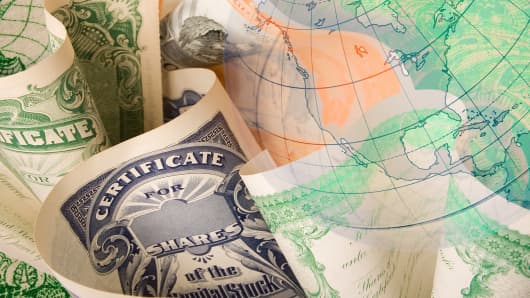With the bond market wide open for business, some strategists expect to see more companies using the debt market to appease shareholder activists. For instance, Ingersoll Rand this week said it would spin off its security business and raise debt to fund a $2 billion share buyback. The company was under pressure from Nelson Peltz. After the announcement, Moody's said it would review the company's ratings for downgrade.
"Not only are yields low, but the covenants are pretty lenient," said Jack Ablin, CIO of BMO Private Bank, of the recent batch of corporate deals. "It certainly was a bubble we saw several years ago. I think we're probably creating a credit bubble again, but that's by design." Ablin said the Fed is trying to encourage activity with its near zero interest rates policy. (Read More: Fed Action Risks Inflation, Veers Into Fiscal Policy: Lacker)
Even Goldman Sachs CEO Lloyd Blankfein laid out a case for caution, when asked by CNBC if the corporate bond market was forming a bubble. "One of the big risks that's looming is the complacency ... by which people are once again complacent about this low level of interest rates," Blankfein said. (Read More:
Investors Face Big Risk Over Interest Rates: Blankfein
)
But still, corporations are advised to take advantage of low rates. "We're advising all companies, and they don't need much prodding, to borrow as much as they think they're going to need as long as they think they're going to need it, because interest rates are so cheap," he said. But he noted that investors seeking duration are investing in those bonds. "At some point there will be a reversal. That will have an effect on portfolios, and people will have losses."
RBS strategists identified more than two dozen S&P 500 companies that announced debt offerings to fund dividends or share buybacks this year. Macy's, Disney, Costco, Amgen, and Western Union are among them.
"There's probably a lot longer shadow list of companies that raised debt under general corporate purposes and have either accelerated dividend payments or paid special dividends. Oracle is on this list," said Ed Marrinan, RBS head of credit strategy
In the case of Western Union, that company's debt was downgraded by Moody's late last month to Baa1 with a negative outlook. The ratings agency specifically cited "continued shareholder friendly actions" alongside concerns about the profitability of its money transfer business.
"It's when the edgier companies do this sort of thing that the rating actions follow pretty quickly," Marrinan said. "Clearly it's becoming an increasingly popular strategy as companies gain greater confidence that economic activity is poised for more improvement as we head into 2013."
Joel Levington, managing director corporate credit at Brookfield Asset Management, said Western Union is an investment grade company to watch, and the bonds it issued this week are already trading below par. Western Union earlier this week completed an offering of $750 million in 3- and 5-year senior unsecured notes. He said often investment grade companies would issue bench mark 10-year or 30-year securities.
"If you look at their stock performance, they've been a huge underperformer for quite some time," he said. "Over the past five years, Western Union has underperformed the S&P 500 by 52.9 percent. So when you see something like that, it always goes (to me) to the left hand side of the balance sheet to asset quality and the management of those assets…The equity market is clearly making a statement."
Hewlett-Packard is at the top of the list of investment grade companies with an unattractive profile, strategists say. Moody's cut HP's long-term credit rating to A3 from Baa1, three levels above junk. The company took a massive $8.8 billion write down against its 2011 $11.1 billion acquisition of Autonomy, accusing it of irregular accounting methods. Moody's said HP revenues will fall five percent next year, pressuring profit margins, and it cut its forecast for free cash flow for next year to $4 billion from $6 to 7 billion — based on corporate restructuring and weaker operating performance. (Read More: How a Desperate HP Suspended Disbelief for Autonomy Deal)
"It's really an interesting case," said Levington. "Instead of being able to focus on external growth to move into new markets … they're really focused on cleaning their balance sheet up."
Levington also points to Safeway as an unattractive investment grade bond. Safeway stock also underperformed the S&P by 52 percent over the past five years. "They've been downgraded a year ago in November to the lowest rung in investment grade. It's a name that could easily tip over," he said. He said the company's $2.1 billion in share repurchases outpaced the company's cash flow. "What I'm seeing is their borrowing went up $1.3 billion," he said
"It's just an exchange of money from debt holders to equity holders. They're ratcheting up their financial risk. In the case of Safeway, they're doing it where they're paying out more to shareholders than they are generating in cash," he said.
Most of the investment grade companies that have tapped the debt market to fund dividends have the financial fortitude to do so, even if their ratings are temporarily hit. Costco was rapped by Fitch for issuing debt to pay for its $7 per share or $3 billion dividend. It cut the retailer's issuer default rating to A plus from AA minus. Fitch said the debt offering will increase Costco's leverage ratio to 1.7 times on a pro forma basis, and it would remain elevated over the next three years but that it should return to a lower level longer term as it does not expect Costco to issue further debt.



